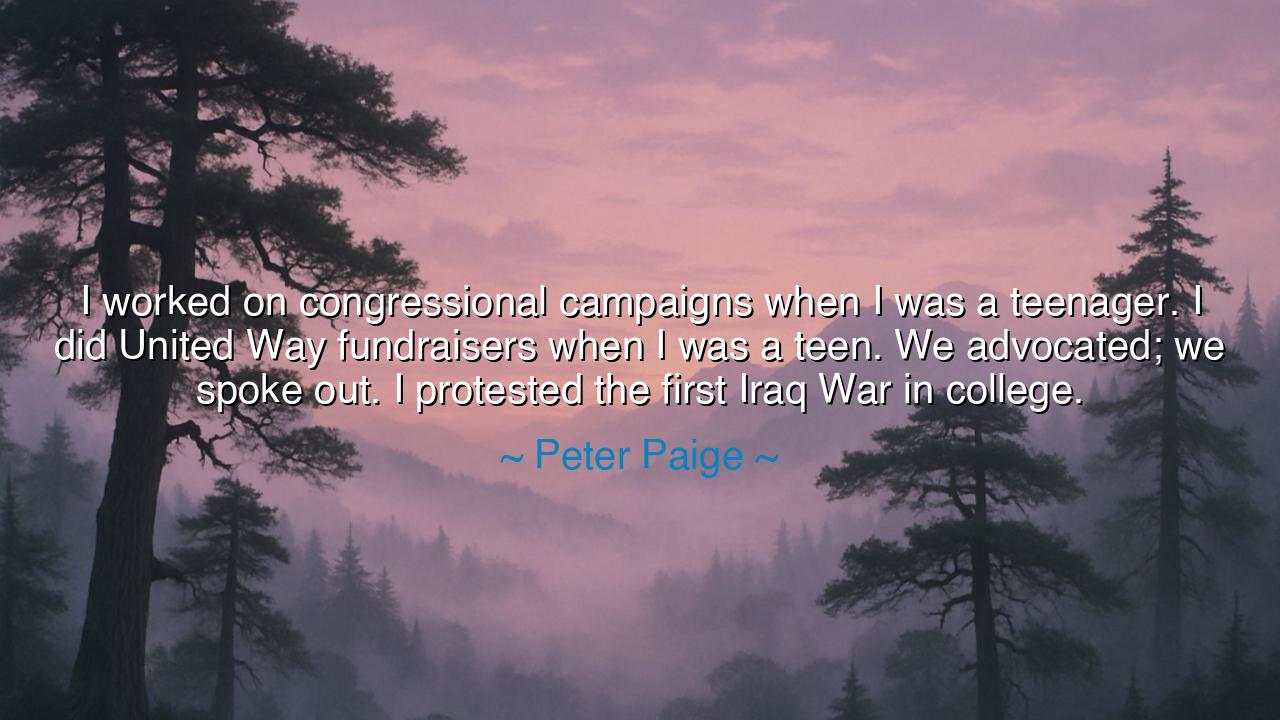
I worked on congressional campaigns when I was a teenager. I did
I worked on congressional campaigns when I was a teenager. I did United Way fundraisers when I was a teen. We advocated; we spoke out. I protested the first Iraq War in college.






Hear the voice of Peter Paige, who declared with pride and remembrance: “I worked on congressional campaigns when I was a teenager. I did United Way fundraisers when I was a teen. We advocated; we spoke out. I protested the first Iraq War in college.” These words are not merely the recounting of youthful activities, but a testament to the spirit of engagement, the refusal to be silent, the conviction that even the young bear the responsibility of shaping the world. His life in these words is a torch, showing how passion for justice must be kindled not in old age, but in the earliest days of awakening.
To labor for congressional campaigns as a youth is to step into the arena of power before others even dare to raise their eyes. While many teenagers are absorbed by the fleeting concerns of self, Paige gave his strength to the greater body politic. His actions proclaimed the ancient truth: that citizenship is not passive, but active; that democracy demands more than spectators—it demands warriors of conscience, even in their youth.
When he speaks of United Way fundraisers, he reminds us that advocacy is not only about battles of law and policy, but also about compassion, service, and the lifting of others. Here we see the union of justice and mercy, of politics and humanity. To raise funds for the needy is to recognize that society is a single body, and when one part suffers, all suffer. Paige’s words resound with the wisdom that true greatness is measured not by what we keep, but by what we give.
And when he says, “We advocated; we spoke out,” he calls forth the heroic lineage of all who have raised their voices against silence. For silence is the ally of oppression, but the spoken word, when joined by many, becomes a force greater than swords or armies. History bears witness: in the marches of Gandhi, in the speeches of Martin Luther King Jr., in the writings of Thomas Paine, words carried more power than steel. So it was in Paige’s youth—his voice joined to the chorus of the brave, shaping the moral winds of his time.
His protest of the first Iraq War in college echoes the timeless struggle of conscience against the might of empire. Like the students who filled the streets in the Vietnam era, or the citizens of Rome who once shouted against unjust wars, Paige stood as one who would not be complicit. To protest is to stand in the open, vulnerable yet resolute, declaring: “I may not hold power, but I hold truth.” This, too, is the work of the young, who see with clear eyes what the old sometimes obscure with caution or compromise.
The lesson in these words is clear: engagement is not reserved for the seasoned, nor for the powerful—it begins wherever you stand. Youth is not a time only for play, but a time to plant the seeds of justice, courage, and compassion. Do not think your voice too small, your hands too weak, your years too few. Paige’s life shows that action taken early not only shapes the world, but also shapes the soul, preparing it for greater battles to come.
So what must you do? Begin where you are. If injustice stirs your heart, speak against it. If a neighbor suffers, lift them. Join in service, raise your voice, give your time. Do not wait until age grants you titles or power, for by then the moment may have passed. As Peter Paige reminds us, the work of shaping the world begins in youth and does not end until life itself closes. Let his story be a beacon: advocate, serve, protest, and above all, never be silent when truth calls.






AAdministratorAdministrator
Welcome, honored guests. Please leave a comment, we will respond soon